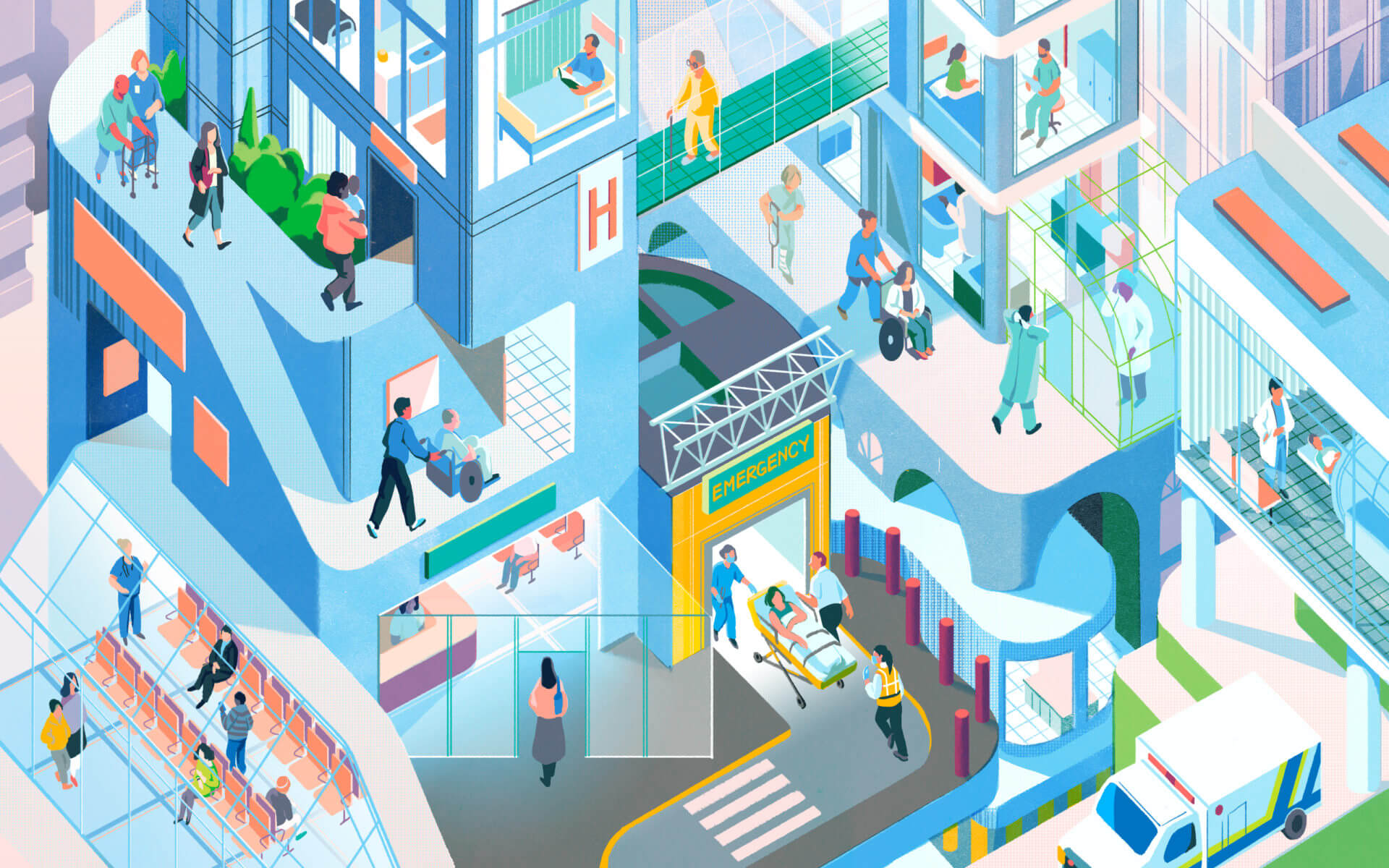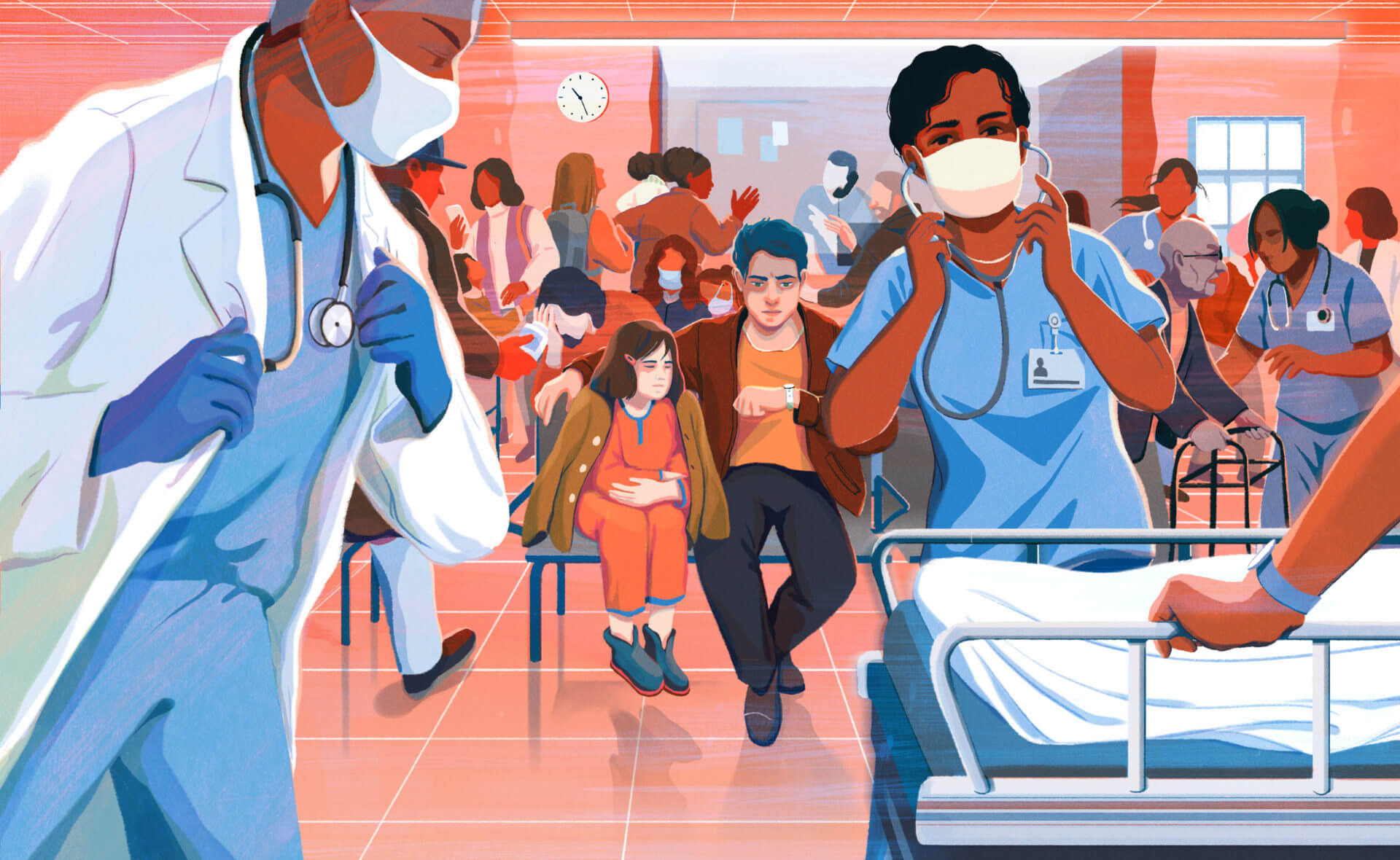Engineering an Urgent Redesign for America’s Healthcare System
A father and daughter walk into an emergency room late one night, the girl in agony with a possible broken arm after falling from her top bunk. They speak to the triage nurse but are forced to remain in the waiting room while the overrun ER deals with more urgent cases. Nearly three hours later, they are seen, and the girl is referred for an X-ray.
Meanwhile, the hospital’s diagnostic imaging department has been eerily quiet all night. Staff has caught up on paperwork and even took much-needed breaks. But then a sudden surge of patients arrives, including the father and daughter, straining the resources of the skeleton staff. Now, the exhausted girl faces more hours waiting in pain before she can be diagnosed and treated.
This was a common scenario in many U.S. hospitals even before the advent of COVID-19.
Investigative journalism publication ProPublica monitors ER wait times, and recently found that California ER patients face a 5 hour, 34 minute wait before they are admitted to a hospital. The Bloomberg Health Care Efficiency Index of 2016 also ranked the United States 50th out of 55 countries for the performance of its healthcare systems.
Conversely, Americans pay nearly the most in the world for care, with the second-highest spending per capita, at $9,403 per person.
The COVID-19 crisis has thrown the inefficiencies of the U.S. healthcare system into stark relief, with horrifying reports of overwhelmed hospitals in hot spots in parts of Florida and Texas, and a lack of personal protective equipment for frontline workers and testing capabilities, thanks to inadequate coordination and planning and failure of supply chains.
Faculty within USC Viterbi’s Daniel J. Epstein Department of Industrial and Systems Engineering want to change this. They hope to train a cohort of graduates and equip them to overhaul inefficient hospitals, clinics and supply chains to provide better care for all. In partnership with the Keck School of Medicine of USC and the USC Sol Price School of Public Policy, the department is launching a new master’s degree in health systems management engineering, mobilizing the skills of industrial engineers to address the specialized needs of the healthcare industry. The degree is the first of its kind in the western United States.
Maged Dessouky, Dean’s Professor and Epstein Department chair, said that failures in healthcare are often the result of poor scheduling. Blockages also occur when areas operate in silos, without regard for other parts of the system that are dependent on them.
“In the ER, long waiting times are not always due to poor staffing — they have to do with something backing up,” Dessouky said. “For example, a room in the ER is being taken because a person can’t be admitted to the hospital. There is no coordination.
“So now you can’t let a new patient into the ER treatment room because there is a person sitting there who can’t be admitted to the hospital because of poor scheduling,” he added.

Lecturer David Belson has been instrumental in the creation of the new program. He has studied the waste and inefficiency in hospitals and healthcare systems for nearly two decades as a consultant. Belson has also led USC Viterbi students in research projects studying the workings of Los Angeles hospitals. These projects only demonstrated to him the unique skills that industrial and systems engineers have to offer in finding solutions, and the urgent need for a program that could best train these graduates.
He said hospitals often do ill-advised things like not scheduling enough staff, or scheduling others when they’re not needed, along with other issues such as poorly planned layouts, especially in waiting rooms.
“In industry, there’s always somebody scheduling a factory or managing the wait time at an airline,” Belson said. “But it all applies in healthcare, too.”
Belson estimates that 40% to 50% of healthcare costs come from waste, such as unnecessary paperwork and unneeded tests. He said engineers are best at identifying and getting rid of such problems.
“The patient should move through the system like water flowing through a river,” Belson said. “But often in the U.S., healthcare is not a system. It’s a bunch of separate pieces.”

The master’s program is possible thanks to support from the department’s name donor, Daniel J. Epstein. His support will not only enable the degree program but also the appointment of a program director, as well as a state-of-the-art DEN@Viterbi facility offering students a collaborative learning environment and online delivery for their courses.
There will also be 10 scholarships offered during the first five years of the program to attract strong students from the outset.
The coursework will focus on improving and optimizing processes in healthcare, as well as strategies to help providers make decisions that are informed by data. This will allow students to adapt best practices from a variety of industries, such as Toyota’s automotive production system, Lean, which is focused on waste elimination. Faculty from Keck will also teach a core course about the healthcare industry, allowing students to understand how the principles of industrial and systems engineering can apply to this sector.
Students will have the opportunity to work on capstone projects in hospitals and healthcare institutions, allowing them to apply their learning in a real-world setting.
For Epstein, offering his foundation’s support for the course was an easy decision.
“When you overlay the advent of the COVID-19 crisis and then the endeavors of the government to deal with it, it became abundantly clear that we really needed an intensive set of skills to deal with the issues, whether that be patient loads, supply chain requirements or how our critical care wards are set up,” Epstein said.
“It just further convinced me that now’s the time, and USC should lead the way,” he added.
Belson said engineers with healthcare backgrounds have more professional opportunities than ever before.
“I think it has a lot of growth potential, particularly given that everybody is focused on healthcare right now,” he said. “Also, the opportunities are not localized to any one geographic area. They are everywhere. Every city in America needs to improve its healthcare system.”
The master of health systems management engineering launched in spring 2021.




